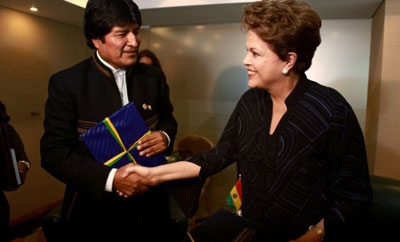Brazilian and Bolivian government ministers will plan joint initiatives in fighting organized crime during meetings this week in Santa Cruz, a southeastern city which has become a major transit point on the Bolivia-Brazil cocaine route.
Brazilian Justice Minister Jose Eduardo Cardozo and Bolivian Interior Minister Carlos Romero will preside over the meetings, reported newspaper La Opinion, with other attendees including Bolivian and Brazilian police, border state officials, and the Brazilian Public Security Secretary Regina Miki.
They will discuss possible measures to be implemented along the Bolivia-Brazil border, in order to combat money laundering and the trafficking of drugs, people, and arms.
InSight Crime Analysis
Security cooperation between Brazil and Bolivia is a strategic move for both countries. President Evo Morales expellled the US Drug Enforcement Administration (DEA) in 2008 and recently threw out USAID as well. While cooperation between the US and Bolivia on counternarcotics continues to some extent, Morales is looking for help in other places.
China recently pledged $8 million defense assistance to Bolivia, and with Brazil looking to become a key force in regional counternarcotics efforts, it is a natural partner for the Andean nation, especially as an estimated 60 to 80 percent of Bolivian cocaine ends up there. Peruvian cocaine is also trafficked through Bolivia to Brazil, which is a major transit point on drug routes to Europe. Members of Brazilian prison gang the First Capital Command (PCC) have been found conducting international drug trafficking operations in Santa Cruz, alongside Colombian and Paraguayan nationals.
The question is whether Brazil is capable of combating organized crime spilling over the two countries’ borders when it has been unable to stem its own problems. Despite border protection and anti-organized crime measures implemented in recent years, Brazil’s domestic violent crime continues to be a major problem and showed some significant rises last year.

